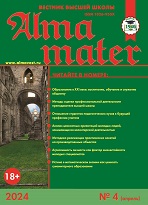UDC 378
https://doi.org/10.20339/AM.07-19.089
A.N. Voytkova is Cand.Sci. (Philology), doc. e-mail: nasstenka@yandex.ru; T.V. Smetanina is Cand.Sci. (Philology), doc. e-mail: stloulou@yandex.ru; and E.A. Universalyuk is Cand.Sci. (Philology), doc. e-mail: elenauniv@mail.ru at Baikal State University
Analyzed is necessity of cognitive and discourse competence development in arts critic students. Highlighted is, that according to requirements of modern world, specialist should be able to apply knowledge of different areas (culture, science, history, etc.), and also to be able to make not only intellectual but also entertaining contribution, when doing professional job. One of the problem of state of museums is being noted unsuccessful communication, for solving of such there is need to change the way of presenting of material, and to make it more competitive. In the article, the authors emphasize importance and necessity of learning foreign languages to communicate successfully with representatives of other cultures, as well as for proper development and professional growth of self-development and professional growth of art critic.
Key words: cognitive discourse competence, professional education, museum institutions, intellectual product, economy of wishes, students arts critic.
References
- Baklashkina, O.N. Modern Educational Technologies in Teaching French (on the Example of the Educational Program of Double Diploma “Russian-French Faculty”. Modern Issues of Professional Education: Experience and Solutions. Irkutsk, 2016. P. 88–92.
- Baranova, N.A. Fundamentals of Formation of Students’ Discourse Competence in Teaching Foreign Professionally Oriented Communication. St.-Petersburg, 2008.
- Besenbayeva, B.A., Kopzhasarova, U.I. On Linguistics Education of Future Teachers of Non-linguistic Faculties in Multilingual Education. URL: http://expeducation.ru/ru/article/view?id=6262
- Voytkova, A.N. Witty Communicative Personality in Comic Discourse: Gender Aspect. Irkutsk, 2010.
- Voytkova, A.N. Contemporary Art History Discourse in the Aspect of Intercultural Communication. Issues of Conceptual Systematics of Language and Speech Activity. Irkutsk, 2013. P. 56–62.
- Glyzina, V.E. Ways of Students’ Creative Activity in English Language Class. Bulletin of Irkutsk State Economic Academy. 2015. No. 3. P. 129–132.
- Zavjalova, A.G. Influence of Interdisciplinary Technologies of Teaching Foreign Language on the Formation of Professional Skills of Future Specialist. Bulletin of Irkutsk state economic academy. 2015. No. 4 (25). P. 728–734.
- Zavyalova, A.G., Kosyakov, V.A. Implementation of Interdisciplinary Approach, Based on Foreign Language in Non-linguistic University: Experience and Prospects. Modern Issues of Vocational Education: Experience and Solutions. Irkutsk, 2016. P. 371–378.
- Melgunova, A.G. One of the Ways of Business English Teaching Upgrade at University in Compliance with the New State Standards of Higher Vocational Education. Bulletin of Irkutsk state economic academy. 2013. No. 2 (88). P. 141–144.
- Museum: Present and Past. Iskusstvo. 2012. No. 2 (581). P. 17.
- Obraztsov, P.I., Ivanova O.Yu. Professionally oriented Foreign Language Teaching at Non-language Faculties of Universities. Orel, 2005.
- Petrunina, E.A. Modern Small-Town Museum: Problems and Prospects. Space and Being of Modern Culture: Theoretical and Applied Aspects of Research. Saratov, 2016. P. 65–71.
- Аdorno, Th.W. Valéry Proust Museum. Cambridge, Massachusetts, 1988. P. 173–186.











.png)






